I have to admit, I was a bit intimidated when picking up Neuromancer for my book choice this week. Having heard so much about this book for years, I wasn't sure what to expect. I've read snippets of William Gibson's prose before, and found it surprisingly abrupt, harsh and...specific...I guess would be the best word. I suppose I was initially thrown by that, especially coming from the past few books I've read (The Outsiders, Go Ask Alice), where the writing is much more fluid and free-form than this. Gibson's writing isn't pillowy or forgiving, it rips into you sentence after sentence:
The cultivation of a certain tame paranoia was something Case took for granted. The trick lay in not letting it get out of control. But that could be quite a trick, behind a stack of octagons. He fought the adrenaline surge and composed his narrow features in a mask of bored vacancy, pretending to let the crowd carry him along. When he saw a darkened display window, he managed to pause by it. The place was a surgical boutique, closed for renovations. With his hands in the pockets of his jacket he stated through the glass at a flat lozenge of vatgrown flesh that lay on a carved pedestal of imitation jade. The color of its skin reminded him of Zone's whores; it was tattooed with a luminous digital display wired to a subcutaneous chip. Why bother with the surgery, he found himself thinking, while sweat coursed down his ribs, when you could just carry the thing around in your pocket? (14)After getting over my initial disconnect with Neuromancer's prose, I had to then contend with my utter lack of knowledge of science fiction lingo. Not that I haven't been a "fan" of science fiction, I really have nothing against it, but I've read woefully little of it. As soon as Gibson plopped me down in the gritty alleyways of Chiba City, I'm already so disoriented that it takes several chapters to even understand "jacking in" and "trodes", let alone the mechanics of ice and the evils of the AI. I think it was around a third of the way into the book when I finally found my feet and began to sift through the intricate storyline and "figure it all out." Even now, having finished the book, set it aside with a deep breath and contemplated it for awhile, I'm not certain I've got everything. Neuromancer seems like a book that needs to be picked up more than once--of that I am certain.
I suppose the thing that stuck with me the most in my first reading of this text is the degree of communication and connection with his "deck" that Case experiences. The most significant aspect of this, at least for me, is the appropriation of "The Flatline" as a personality, guide and driving force for Case's computer. At first, I didn't really understand--was the computer using Case's memories of Dixie (his voice and mannerisms, etc.) to simply put him at ease? After some discussion with a friend, I began to understand The Flatline as something more complex than that. He is a computer, certainly, and he is referred to as a "construct" on multiple occasions. And yet we also know by the end that he has his own desires--he wants to be destroyed. The Flatline occupies a space that is both organic and man-made, but occupies that space without expressing the conflict that traditionally accompanies such a position. At the end of the book, we understand that Dixie is not dead, but rather seems to have been freed into the matrix. I guess I'm not really sure what to think about him. Wintermute and Neuromancer, the two AIs of Tessier-Ashpool, also seemed to touch on this embodied machine concept--I'm sure there's some kind of master's thesis in there somewhere (probably already has been).
While I am glad to have finished my book for the week, I do think that with this project comes a set of limitations that will be frustrating in the weeks to come. It's a big goal, and I've acknowledged that, but pushing through Neuromancer to finish it within the week was challenging, and I fear may have affected the quality of my reading. The project also necessarily eliminates texts which are too long to be completed in a week, so my dreams of finally finishing Watership Down may have to wait. But I'll press on, and we'll see just how such a project can help me grow and develop as a scholar, and as an individual.
In the meantime, some Neuromancer pictures to dress up my post:
William Gibson himself.
The Neuromancer graphic novel.
And a final quote:
And he was remembering an ancient story, a king placing coins on a chessboard, doubling the amount at each square...Exponential....Darkness fell in from every side, a sphere of singing black, pressure on the extended crystal nerves of the universe of data he had nearly become....And when he was nothing, compressed at the heart of all that dark, there came a point where the dark could be no more, and something tore.








No comments:
Post a Comment